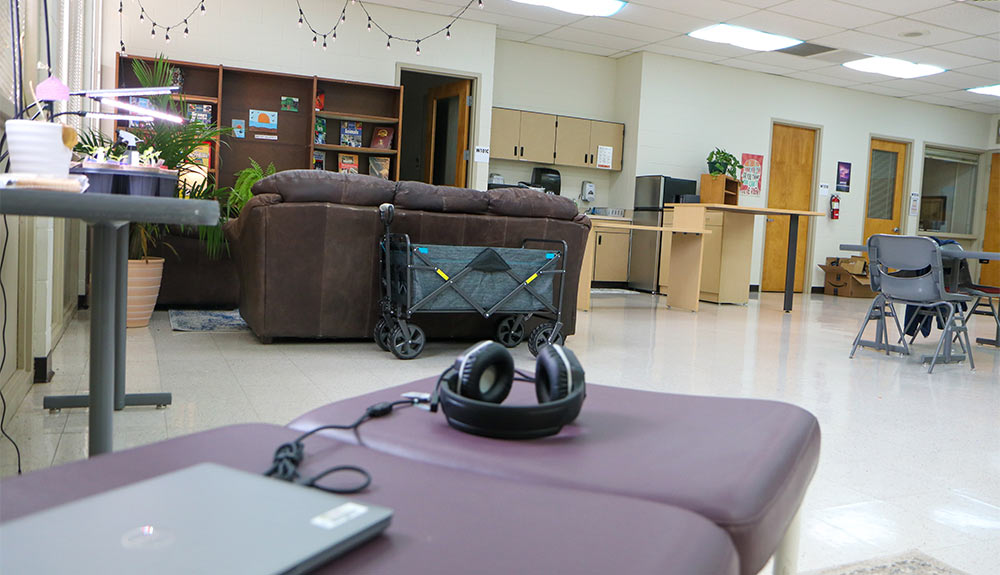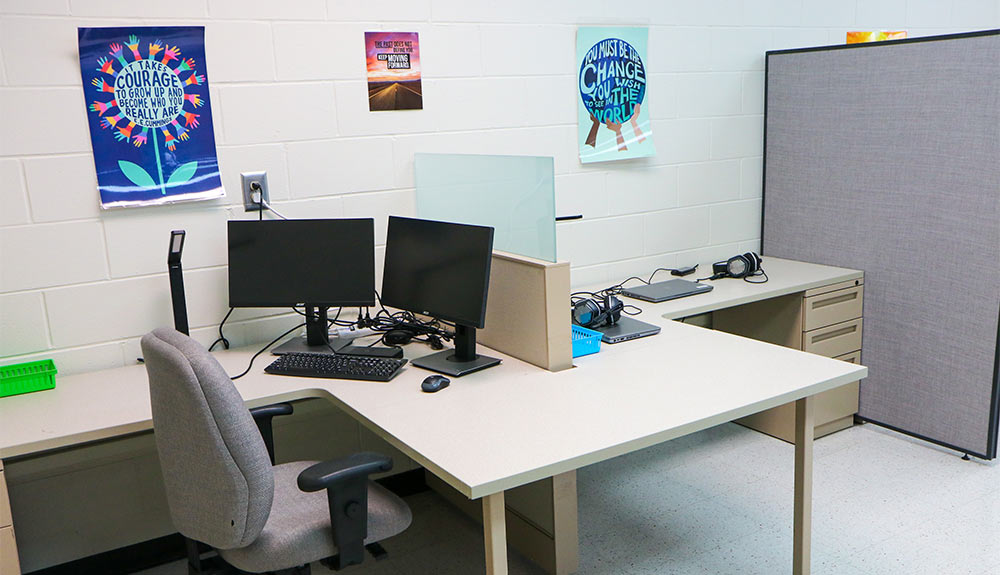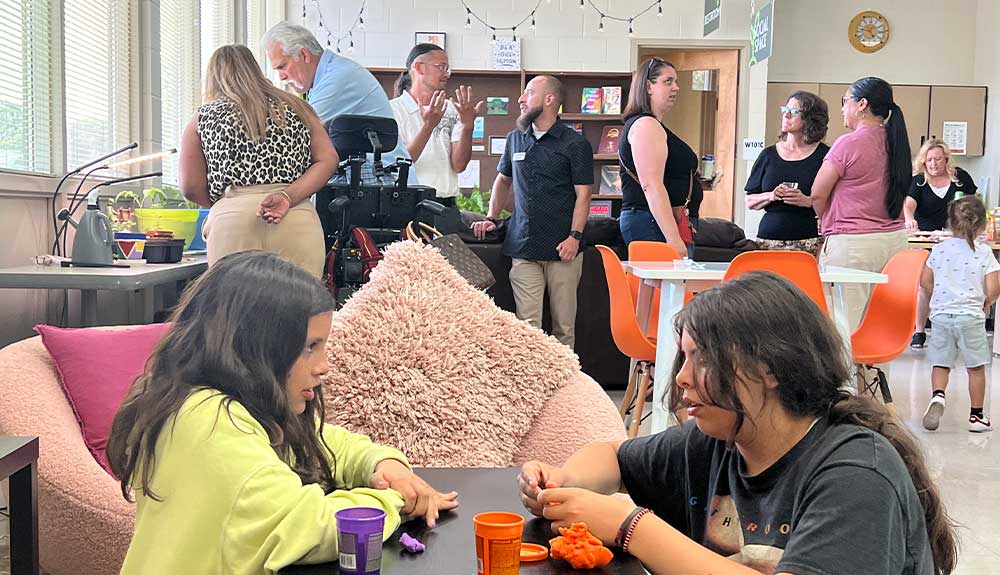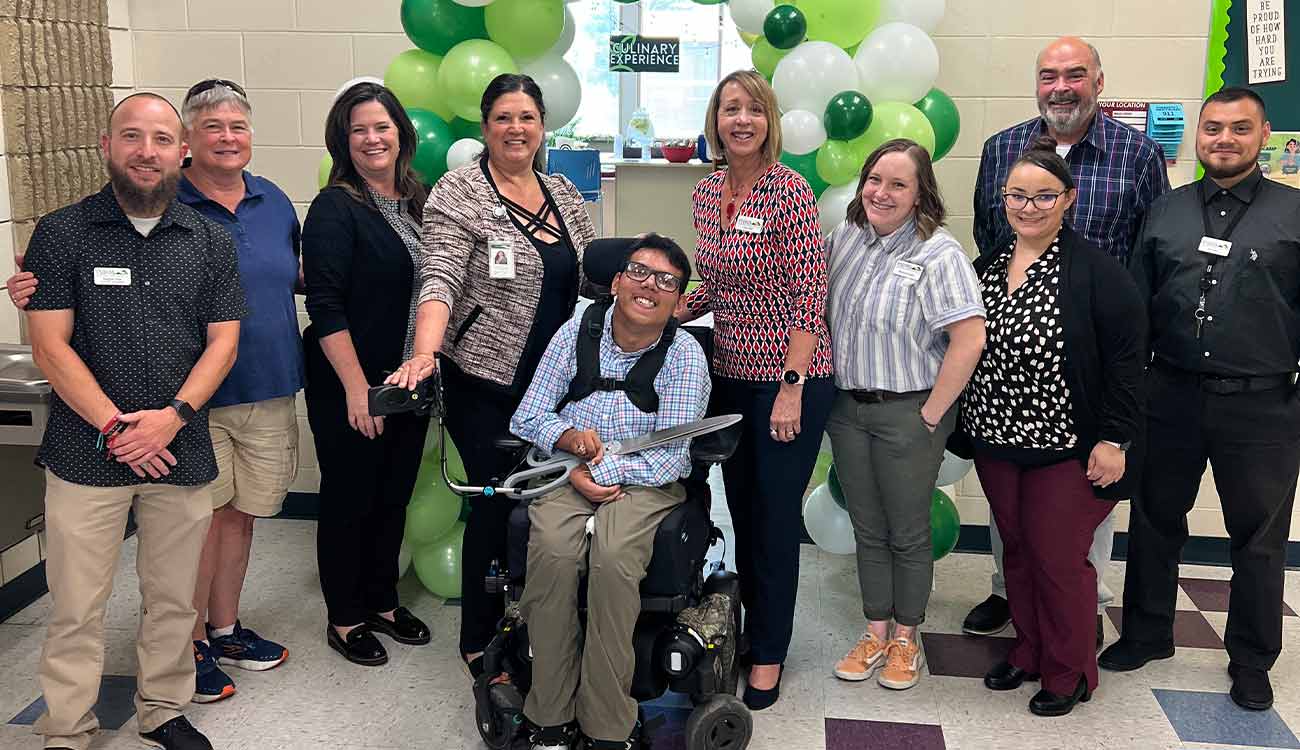New partnership opens opportunity for individuals with intellectual and developmental disabilities
Japheth Hook has been wheelchair-bound since birth. With cerebral palsy limiting his movement, his father Randy says the family focused on what was most important, Japheth’s education.
“He’s always been on the honor roll, but he’s also wanted to interact more normally with people,” said Randy Hook. “So years ago we started asking him what he desired and what he wants to do with his life.”
Those conversations eventually led to Japheth exploring career opportunities in criminal investigations and, this spring, enrolling in a new program that supports students with intellectual and development disabilities (I/DD) in their transition from high school into adulthood. The program, called LINK, is a partnership between Educational Service District 105 and local K-12 school districts and based at Yakima Valley College.
“As a parent, my whole life has been fighting for Japheth and his education,” Hook said. “One of the things that enticed me about LINK is they’ll work with Japheth and get him what he needs for his education so that he can take that next step into his career and adulthood.”

“One of the great things about LINK is they open up career choices to the child’s mind and what is possible for them.”
— Randy Hook, parent of LINK student
LINK empowers
Sam Blazina, transition services program manager for ESD 105, said the LINK partnership aims to bring together a variety of services and resources for students with I/DD who are 18 – 21 years of age. In doing so, LINK helps those students integrate into their communities and gain the knowledge and skills to successfully choose their pathway into adulthood.
That often can be a challenge. While there are numerous supports and protections for individuals with I/DD while they’re in the K-12 system, Blazina noted those can end abruptly when they age out.
The LINK program eases the transition process. By being based at YVC’s Yakima Campus, LINK students have an opportunity to see how they can succeed outside the K-12 environment and meet more peers.

“Right now, students with intellectual and developmental disabilities are not graduating as successfully in our state as they should be,” Blazina said. “With LINK, it gives them an idea what college is like and determine if a college setting is right for them. It’s about giving them options and choices that they currently don’t have.”
That’s important for parents like Randy Hook.
“One of the great things about LINK is they open up career choices to the child’s mind and what is possible for them,” Hook said. “Then, LINK helps figure out what courses they need to take, help set up job shadowing, and whatever else is needed to take that next step once you’ve figured out that career direction.”
LINK services are individualized based on each person’s needs and goals. Blazina, herself the parent of a child with Down syndrome, is excited about the possibilities for students participating in LINK.
“This partnership can help them step out of their comfort zone and become self-determinative in their own lives,” she said.
“[Students] want to feel like they fit it, that they have that option to go to college too. [LINK] makes it feel like they belong and they have support to do those same things, even if it looks a little different.”
— Brittney Clark, Wapato High School transition/special education teacher
The college connection
Brittney Clark has served as a transition/special education teacher at Wapato High School for five years and noted that a significant issue for the students she serves is helping them feel like they are graduating from high school and moving on to the next stage in life. However, that’s been challenging to do in Wapato.
“Our students walk for graduation, but then that transition program is currently in the high school, so they’re a little confused,” Clark said. “With the LINK program, it’s at the college, so students feel like they’re moving on to the next part of their lives while they’re working on that transition.”
Students with I/DD oftentimes feel a bit singled out in the high school environment, Clark said, and she’s excited for how LINK is helping to change that.
“[Students] want to feel like they fit it, that they have that option to go to college too,” she said. “It makes it feel like they belong and they have support to do those same things, even if it looks a little different. It gives them confidence and a sense of fitting in with their age group and peers who are going to college.”
Being housed at YVC is an essential aspect of the program, Blazina said.
“While on campus, they can partake in YVC events. They can eat in the cafeteria and see what student life is like. They could potentially do some job training at YVC’s campus as well as out in the community,” she said. “It really is an opportunity to learn the hard and soft skills needed to successfully exit the public school system and be ready for the life they want.”
In the future, Blazina has hopes to integrate LINK students even more deeply with the YVC community, such as by recruiting YVC students to serve as peer mentors.

YVC Vice President of Instruction and Student Services Jennifer Ernst noted that working so closely with ESD 105 to bring LINK to the college’s Yakima Campus has given the institution an opportunity to serve the community in new ways.
“YVC is committed to responding to student needs and supporting them in achieving their academic and career goals,” Ernst said. “Partnering with ESD 105 and our local school districts is a wonderful opportunity to advance our mission.”
One student in Wapato’s transition program just recently started participating in LINK and Clark said the impact has been immediate.
“She is loving it,” Clark said. “We only see her on Fridays now, all the other days she is at LINK. It seems like she’s having a really good time and has things to talk about with her friends, like going to a college art class and being able to hang one of her paintings on the wall at LINK. In Wapato, students in our program are pretty much together their whole high school experience, so it’s nice for them to hear about someone having new experiences.”
Clark said another of her students who graduated this year will be enrolling in LINK next fall and she continues to educate parents about their options.
“I grew up on the west side [of Washington] in Auburn and Kent and they’ve had transition programs established for awhile, so when I came over here to teach and didn’t see those types of programs it was definitely a need I saw,” she said. “It’s exciting to be creating more opportunities for young people here in Yakima Valley and see programs being built and ideas being exchanged.”
“Children need kindness, and I see that Japheth is getting that at LINK.”
— Randy Hook, Japheth’s father
ESD 105 supports 25 public school districts and more than 20 state-approved private and tribal schools in south central Washington and the LINK program is the first of its kind in the region. The program launched in January and is planning for additional enrollment in the 2023-24 school year and beyond as awareness spreads across the region.
That’s exciting news for the Hook family, with Japheth continuing in the program next year. Hook noted that his son has especially benefitted from the care shown by LINK’s staff.
“Children need kindness, and I see that Japheth is getting that at LINK,” Hook said. “If I can get Japheth through college and in a job so he’s independent before I go, I’ll be happy. I feel LINK is a great way for families to look at their career opportunities that are best for their child and their personality and their desires.”
